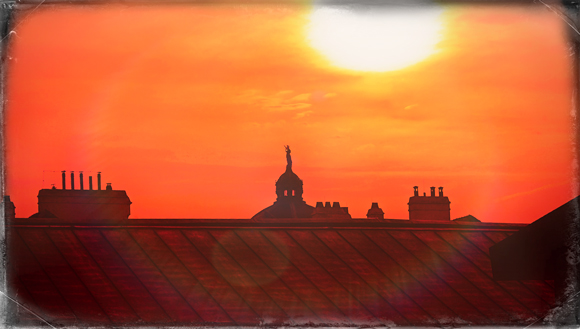It seems not long time ago I stood before Moscow grocery store, chilled to the marrow and hungry, eager to get my portion of buckwheat, in line with hundreds of other hopping, popping and clinking with empty bottles Muscovites. It was after putsch time, when Boris Eltsin – then boisterous and robust-looking man who instigated spirit of rebel in red-carpeted corridors of ruling power, would appear in front of White House mounted on the tank, like Lenin in 1917. Eltsin conquered particular admiration and support from inhabitants of suburban Zelenograd, where I resided at that time.
It was center of national electronic industry with military styled, barbed wire fenced plants standing in ruin, with workers getting no salary for years in a row. We greeted all the revolutionary change could bring. It brought hope. But also disorder. Shop windows stared back at us with blind sockets of empty shelves. Pensioners could buy only a box of vodka for their lifelong savings. We kept in purse not money but ration cards. Life was wasted in queues. The broken window was secured with piece of carton, and February wind whistled in cracks of small hotel room. I pooled old newspapers and jacket at the top of my bed, but could not fall asleep. Tranquility and slumber eluded me. The sheets of manuscript at the table seemed snowy blue in lucid moonlight. Rolling over, I eventually sprang to the feet. I boiled some tea with camp boiler from my travel set, and after sipping it hastily, came out.
It was Vilnius of 1991. The air of the night was clear and mild. The stars glimmered exceedingly bright and low. I felt fresh breathing of Baltic see on my cheeks. After overcrowded Moscow streets, Vilnius with its thin spires and lattice windows looked idyllic and fabulous, very much like medieval golden music box with tiny figurines of cavaliers and dames I saw once in window of antique shop.
However, the empty streets with remains of hastily erected barricades looked disturbing. It was a few weeks after the Russian tanks entered the town. It was extraordinary attempt of authorities to pacify folks of former empire by old imperial methods. For many ordinary people Vilnius intervention always symbolized later the end of soviet era. The callousness and hysteria of generals, their war-prone decisions caused confusion and bloodshed. There were victims – defenders of Lithuanian sovereignty and occasional pedestrians as well. National representatives made rebellious “justice or death” statement and retreated in the barricaded building of Lithuanian parliament together with the troops of volunteers.
In the early morning securities let accredited journalists inside after confiscation of cameras. The press males had been examined all over, and the females – only two of us, due to courtesy of Lithuanians, were spared of body search. The civilians – volunteers in bulletproof vests – tall light-haired young men who spoke Russian with peculiar accent – looked earnest and sad. They prepared to die.
Improvised solders slept on the floor of parliament chambers by turn, expecting the burst of new military attack every minute and ready to defend the citadel of national freedom till the end. Every window had been barricaded with sand sacks and watched.
I was special correspondent of one newly established unaffiliated newspaper. Only because its headlines sounded somewhat Christian, volunteers let me in.
Ignoring political labeling, newspaper appealed to compassion and common sense of people of any nationality and views, reporting on poor, ostracized, deprived and downtrodden. My heroes were convicts, outcasts, homeless, truth seekers and victims of national outbursts.
After press conference with prime minister seventy journalists left for their quarters. Only three of us stayed in the barricaded parliament with volunteers, keeping true evidence valued most.
There were rumors new assault would begin tonight. The chamber and staircase had been mined. We stayed there to share self-denying courageousness of ordinary Vilnius people. There was no electricity in the building, and the faces of volunteers seemed greenish in candlelight.
I talked to young solemn Lithuanian. He left his wife and daughter in the town to enter the defense troops, and kept small Christian icon in embrasure of window beside the gun. If our life is only night dream, why we all are afraid to die?
